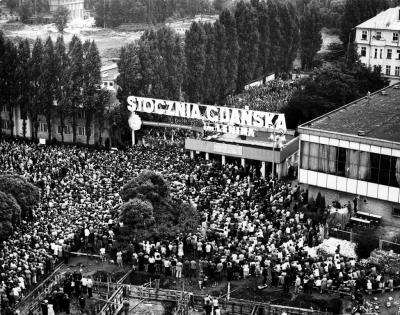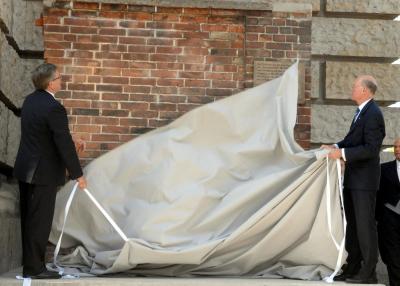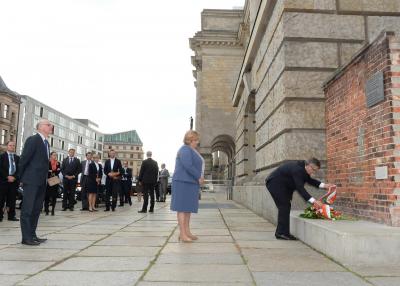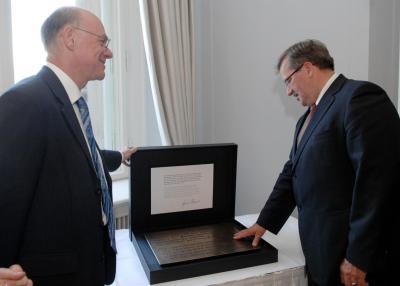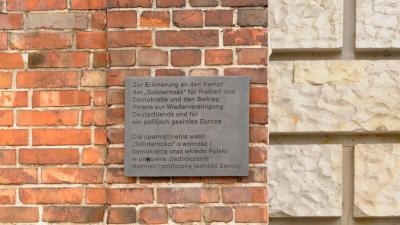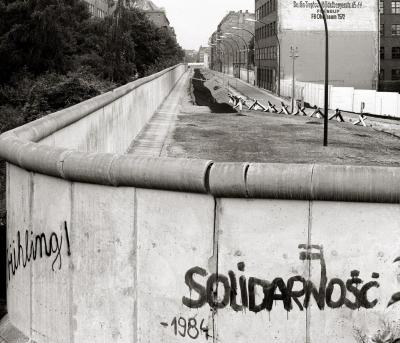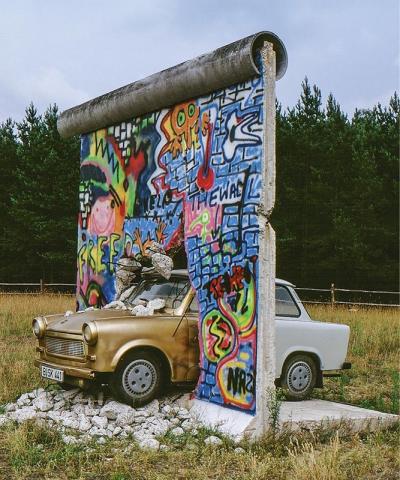A piece of “Solidarność”: The fragment of wall from the Gdansk Shipyard in Berlin

It was August 1980 when the first signs of the upheaval in Poland started to be felt: The Polish economy had already been in severe crisis for five years and, in what was the final straw, on 1 July 1980 the Polish government drastically increased food prices again. From that time on, the mood in Poland, which had been simmering, began to boil over until the resentment about the living and working conditions publicly erupted in the early hours of 14 August 1980: The 51-year-old crane driver Anna Walentynowicz was sacked by the management of the Lenin shipyard in Gdansk because of her political commitment. Spontaneously, the other shipyard workers downed tools, demanded the reinstatement of Walentynowicz and asked for a wage increase as well. Towards 11 o’clock in the morning, Lech Walesa, an unemployed electrician, climbed over the wall of the shipyard, which was already closed at this point, and assumed the leadership of the strike movement.
In the days that followed, this sit-in strike spread further afield. On 16 August, an organised enterprise-wide strike movement headed by Walesa was set up in the form of the Inter-Enterprise Strike Committee (Międzyzakładowy Komitet Strajkowy – MKS). Strikes in solidarity with the striking workers at the Lenin shipyard in Gdansk followed in Kraków, Warsaw, Poznan, Lodz, Rzeszów, and subsequently in Waldenburg in Silesia, Bielsko-Biala and Schweidnitz. What was, at the beginning, a strike founded on economic and social grounds, became a political protest movement which took over the whole country in the two weeks that followed. On 31 August 1980, Lech Walesa signed the “Gdansk Agreement” which, for the first time in a communist country, recognised an independent trade union and, at the same time, granted the right to strike and to access the mass media. It was the beginning of the end for the communist regime in Poland. It was the start of democratic change in Central and Eastern Europe, which played its part in overcoming the division of Europe and in the fall of the Berlin wall.
Lech Walesa’s famous jump over the shipyard wall turned the wall into a symbol of the idea of freedom in Poland. In Gdansk, a monument to the Solidarność movement, with a piece of the symbolic wall, was placed in Wały Piastowskie street. And in neighbouring Germany, where there was widespread solidarity for the strike movement, a fitting place was also to be found for a fragment of the old masonry, close to which the fight for democracy had begun in the communist part of Europe.
In 2009, on the initiative of the Marshal of the Sejm Bronisław Komorowski, a piece of wall was delivered to the German Bundestag in Berlin as a gift from the Polish Parliament. On 17 June 2009, the 56th anniversary of the people's uprising in the German Democratic Republic in 1953, the symbolic wall was unveiled as a Polish memorial at the Reichstag building in the presence of German Chancellor Angela Merkel, President of the Bundestag Norbert Lammert and Marshal of the Sejm Bronisław Komorowski.
Katarzyna Salski, October 2018
Further information:
Dieter Bingen, Vorreiter des Umbruchs im Ostblock. Von der Solidarność zum Kriegsrecht (1980-1981), 2009. http://www.bpb.de/geschichte/zeitgeschichte/deutsch-polnische-beziehungen/39757/polen-als-vorreiter-des-umbruchs?p=all (last accessed on: 23/10/2018)
Film: https://www.youtube.com/watch?v=SXzY8drn5q8
